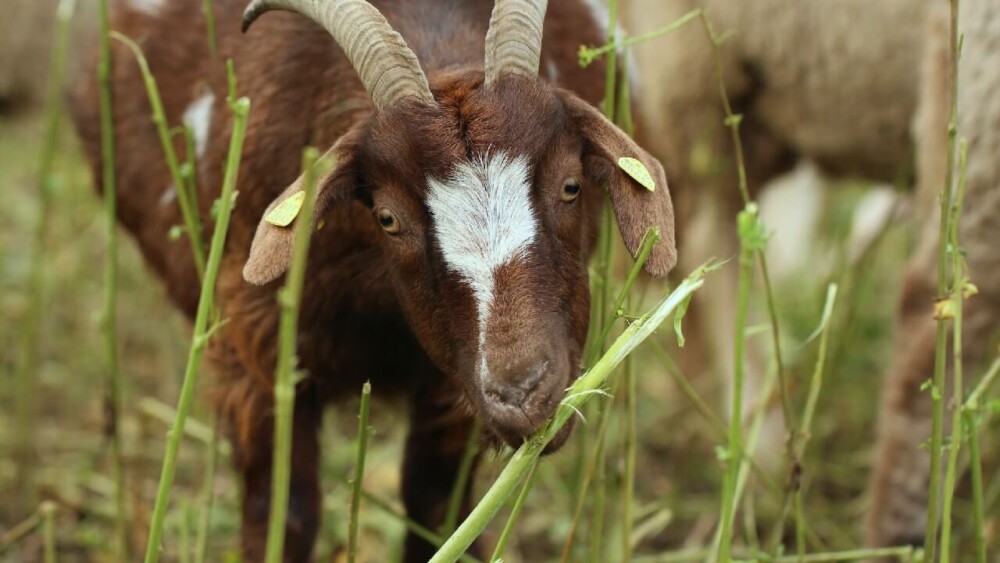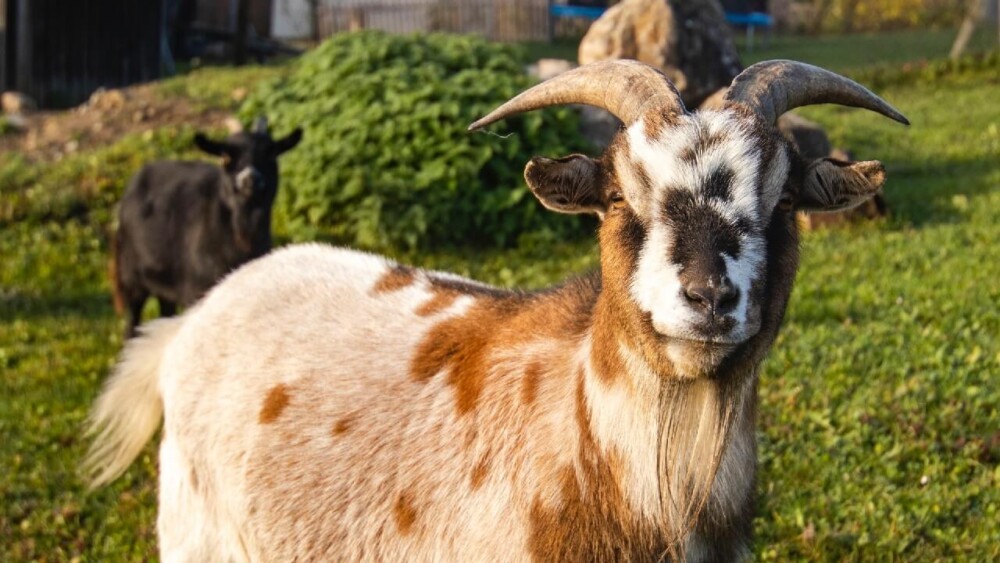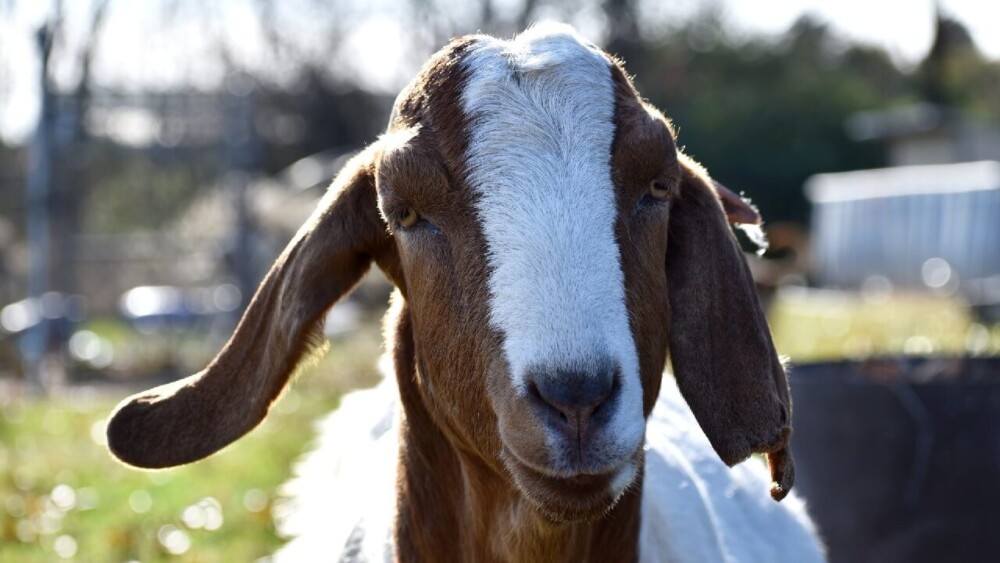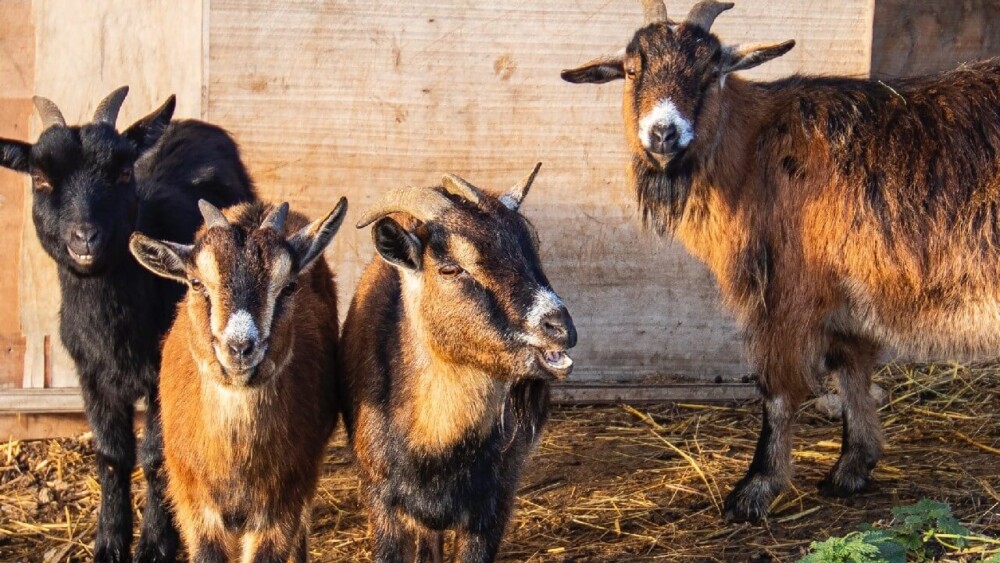
Some of the most common questions I get are around goat vaccinations. Goats are gaining in popularity, both as pets and for utility. As their population grows, so do some of the risks of transmitting diseases between herds and among people.
Do goats need vaccinations? Goats need vaccinations. The number of vaccinations that a goat requires for optimal health is dependant on its location, country of origin, and other risk factors. There is debate in the goat community around how many and which vaccinations goats need. Vaccinations are an important disease prevention measure. Even goats with low risk need at least the CD&T vaccination regularly.
In addition to CD&T, many experts also recommend that goats be dewormed regularly. I cover deworming in this article in great length.
Goats suffer from numerous diseases that are preventable through vaccinations and a combination of other measures. Every goat farmer should have a goat vaccination program that is effective. Doing this will help to keep your goats safe from infectious diseases.
When I was a fairly new goat owner, I purchased wether. I didn’t stop to consider the risks and immediately introduced him to my herd. Within 3 days, my entire herd was coughing, and a day later, I had goats that weren’t eating anymore. I took immediate action and was able to bring my herd up to great health again.
And, I was lucky. My goats had pneumonia. But, they could have caught something more deadly and permanent in its effects.
Let’s dive into the various goat vaccinations.
What Vaccines Do Your Goats Need?
While vaccines help protect goats from dangerous diseases, you do not need to vaccinate your herd against each disease. Specific regions are more at risk of certain diseases and rarely see other diseases. The vaccinations you’ll want to give your goats will depend on the risk factors for contracting those diseases.
Goat Vaccination Schedule
| Vaccination | Age of Initial Shot | Frequency Thereafter | Recommended for Whom? |
| CDT | 6-10 weeks, or as soon as possible thereafter | Two shots initially and at least annually thereafter. | All goats |
| Pneumonia Mannheimia haemolytica and Pasteurella multocida | At 3 months old. Older goats can also receive it. | Booster again at 6 months. Older goats that get it should get a booster 2-4 weeks later. Annual boosters thereafter (Usually 2-4 weeks before kidding) | All goats |
| Brucella melitensis Rev 1 Vaccine | 3 months and older. | Every 5 years | All goats |
| CL vaccination: Live | 3+ months, but only if introduced to a herd with CL | Currently, no boosters are given for CL. | Only among herds with CL infected goats. Use with caution. |
| Rabies vaccination | 3+ months | Boosters may be required if the animal is exposed or bitten | All goats in areas where rabies is found |
| Sore Mouth Vaccination: Live | 1 year | Annually | Only in herds where Sore mouth is present. Once given- must be regiven annually |
| Foot and Mouth Disease Vaccine | 1 year | Booster every 6 months | Herds in Asia, Africa, or the Middle East. The US is working on an approved vaccine with 2018 funding. |
Goat Vaccines
As I cover goat vaccinations, there are several terms and factors that you’ll need to understand.
Modified Live Versus Killed Vaccinations
Goat vaccines are either modified live vaccines or killed vaccines. Modified live vaccines include a weakened pathogen. It’s a more effective vaccination because your goat’s immune system will more quickly and easily recognize the disease and fight it.
A killed vaccine includes components of a pathogen but not the actual pathogen. It’s meant to train your goat’s immune system to recognize the signs of the disease and fight it. Killed vaccinations usually have to be boosted or given regularly because they aren’t as effective.
Goat Products After Vaccination
It’s important to track and record your goat’s vaccinations to know when you can use goat products from them. Many vaccinations, and types of dewormers, require a minimum time to pass before any of the goat’s products can be consumed by humans. That’s because it poses a risk to people, and the vaccinations aren’t approved for human consumption.
Goat products include both meat and milk. I’ve talked to many goat owners, and they easily remember not to consume goat meat after vaccinations but often forget they should toss that goat milk until after the waiting period.
- Most vaccinations require up to a 60 day waiting period.
- Many dewormers require a 90-120 day waiting period. You can also purchase dewormers that are approved for a no-wait or lower wait period.
There are seven major goat vaccinations. Not all of these are necessary for every goat, but it’s a good idea to be aware of any local issues with diseases so that you can be proactive and keep your goats safe!
What vaccinations do goats need?

CD&T (Clostridium Perfringens types C and D and Tetenus.
CD&T is the vaccination that is universally encouraged. CD&T is considered a core vaccination for goats because it vaccinates against tetanus and overeating disease. Both of these diseases a goat can get without any contact with an infected goat. Goats carry the bacteria for overeating disease in their gut and can contract tetanus from the dirt.
Tetanus is caused by your goat getting a cut and coming in contact with Clostridium tetani bacteria through the wound. It is commonly found in the dirt and on rusty metal. Goats are particularly susceptible to it because they are curious and will chew on anything. My goats even chew on the metal fencing, so they would probably already have tetanus if they weren’t immunized with CDT!
Goats with tetanus will be very stiff, have trouble eating, and become paralyzed and die within days. Once a goat gets paralysis, it is very close to death, and it is unlikely it will recover. For more information on Tetanus, check out this article.
Enterotoxemia is also called overeating disease and can cause death. It’s caused by Clostridium perfringens bacteria, which develop in a goat’s gut. Goats already have a small amount of it in their gut. Food mismanagement can cause the bacteria population to grow, so it overwhelms a goat’s system and causes the goat to get very sick.

This isn’t a disease that a goat will catch from another goat.
Overeating disease usually happens when a goat’s diet changes to a diet higher in sugar than their previous diet. An increase in grain, a change in a protein supplement, milk or milk replacer, or a change to alfalfa hay can trigger overeating disease. Check out g
The most common sign of enterotoxemia is the sudden death of a goat. Occasionally goats may show lethargy, diarrhea, and stomach pain before death.
How Often Should The CDT Vaccination Be Given To Goats? Ideally, goats should first be vaccinated from CDT when they are 6-10 weeks old. After the first dose, a second booster dose should be administered 10-14 days later. Two doses should also be given to adult goats that haven’t been vaccinated previously. After the initial two doses, give your goats CDT at least annually.
CDT should be given to pregnant does a month before kidding. My vet recommends 4-6 weeks before kidding. I have called 4 other vets to confirm this recommendation for this article. This helps protect does during birthing and will provide a higher level of antibodies to the kids after birth as long as they nurse and obtain colostrum.
Goats that are fed a rich diet or grains or high-quality pasture grass may need more frequent immunizations. CDT is one vaccination that doesn’t harm goats if they get them too frequently. Many goat producers immunize their goats with CDT quarterly because meat goats usually eat feed high with grain or alfalfa.
- An initial dose of two shots given two weeks
- Annually thereafter
- Vaccinate kids within 1-2 months of birth
- Slaughter or milk consumption time is 21 days after the vaccination.
Other Preventative Measures: Utilizing intelligent feeding strategies can help to prevent overeating disease. There are five important strategies to include in your feeding regime you can check out here.

Caseous Lymphadenitis (CL) Vaccination
Caseous lymphadenitis is a bacterial goat disease characterized by the swelling of the lymph nodes with abscess. Abscesses can occur internally on a goat’s organs. In goats, they usually occur externally around the neck, shoulders, and head. It can also occur on the udders of an infected doe.
CL is highly contagious to other animals and people, so it’s important to take precautions when dealing with any animals with abscesses. It is highly prevalent in the United States. There is a goat vaccination available in the US. Still, it is controversial because it’s not 100% effective, causes goats to test positive later for CL, and occasionally causes side effects in immune-suppressed goats.
Never use a sheep vaccination for a goat because there are usually severe side effects that include lameness for more than a month. The CL vaccination is usually recommended for all new animals introduced to an infected herd. If you get animals infected with CL, the best way to protect the rest of your herd is to cull the infected ones. Check out this article for a more in-depth overview of the identification, treatment, and prevention of CL in your goats.
Goat Rabies Vaccination
Rabies in goats is fairly uncommon but does occur. Goats usually get rabies from wildlife. The most common infectors of goats are bats and skunks, although raccoons have also been known to infect goats.
Goats with rabies will display a change in mood and behavior. They may become unusually calm, but more often, goats will become more aggressive. Difficulty swallowing food, coordination issues, and circling are all symptoms of rabies.
Goats can be vaccinated from rabies through off-label use for sheep or cattle. Some states require that all show animals be vaccinated, even if in an off-label capacity. If you live in an area where rabies is present, vaccinating your goats is a good idea.
Goats need to be at least 3 months old before being vaccinated and need a booster annually. Most rabies vaccinations are killed vaccinations.
Orf: Sore Mouth Vaccination
Sore mouth, or Orf, is an illness that’s similar to chickenpox for goats. It causes sores of pus that turn into dry scabby sores on the lips and gums of sheep and goats. It can affect other areas, such as the teats of nursing mamma goats.
It often affects eating because of the pain of the sores. It is highly contagious and can spread to humans. Isolate all affected animals away from healthy animals and double up on good hygiene when handling animals.
A Sore mouth vaccination is available for sheep and goats but is not recommended because it will contaminate a herd with the disease. Only previously exposed goats should get the vaccination.
Vaccinations are good for a year and require a booster annually. Wait 21 days after vaccination to consume any goat products. Click here for more information on Sore mouth.

Pneumonia Pasteurellosia and Mannheimia Pneumonia
Pneumonic pasteurellosis and Mannheimia are the two most common strains of bacterial pneumonia in goats. These respiratory diseases occur mainly in goats and sheep. Pasteurella is a bacteria that infects the lungs and respiratory system of goats and sheep.
Goals often carry the bacteria in their nasal cavities and bodies. As a result, goats and sheep under higher levels of stress are at the greatest risk of developing pneumonia.
Kids that are going off of weaning or who have lower levels of colostrum in the milk are at the highest risk. Other stressors include travel, mixing with goats or sheep from other herds, or a diet change.
Kids with it have a higher mortality rate than older goats.
Symptoms of pneumonic pasteurellosis in goats are:
- Fever
- Discharge from the nose (snotty nose)
- Difficulty in breathing
- Loss of appetite.
The Mannheimia Haemolytica Pasteurella Multocida Bacterin is licensed for vaccinating goats, sheep, and cattle in the USA. This vaccine has killed components of Mannheimia haemolytica and Pasteurella multocida, which are the two major causative pathogens of pneumonic pasteurellosis.
Give goats the pasteurellosis vaccine when they are under three months old. A booster shot of the vaccine is given between the age of 4 months to 6 months. It is given to goats through a subcutaneous injection. The vaccination requires a waiting period of 21 days. The vaccine can be given annually as a booster.
Brucellosis
Brucellosis is a bacterial disease that causes late-term abortion, fever, depression, weight loss, diarrhea, and udder and testicular inflammation. The disease can spread between goats, cattle, and sheep. It can spread to people and is known as Malta Fever or Mediterranean Fever.
There is no cure for brucellosis in animals. This makes vaccination the key prevention method for brucellosis. You can also help prevent Brucellosis by testing new goats before mixing them with your herd and maintaining good hygiene. This is very important when your milk and care for newborn and pregnant goats.
People get Brucellosis when they come in contact with body fluids of infected goats during kidding or who consume milk or meat from infected goats. Vaccinating your goats will also help protect you from this. There is no vaccination for people.
A modified live vaccine called Rev 1 is currently the most effective vaccine for brucellosis in goats. The main component of this vaccine is a weakened Brucella melitensis pathogen.
The live Brucella Melitensis Vaccine Strain Rev 1 is the most effective of the Brucellosis vaccines available worldwide. Studies have confirmed this. It’s administered via conjunctival method or subcutaneous injection.
It provides a 5-year immunity in goats.
This vaccine is best administered using the conjunctival method, although a subcutaneous injection may also be used. Research has shown that the Rev 1 vaccine provides a 5 year period of immunity in a vaccinated goat. Vaccination of goats after every 5 years is therefore recommended.
The best time to give the vaccine to goats is before puberty. Because it’s a live vaccination, your goats may get a milder version of the disease and are in greater danger during pregnancy. The vaccine can cause spontaneous abortions in pregnant does.
Foot and Mouth Disease
Foot and Mouth Disease (FMD), also known as hoof and mouth disease, is a viral infection of goats, cattle, sheep, and pigs. Generally, the disease is common in animals with divided hooves. The US hasn’t had any detected cases of it since 1926.
In Africa, the Middle East, and Asia, 77% of animals are estimated to circulate FMD. As a result, some goat owners still choose to vaccinate their goats from FMD because of the chance of FMD spreading through wildlife or the importation of infected animals.
The FMD vaccine is a killed vaccine and is made from the serotype that causes the infection.
The FMD vaccine is administered by subcutaneous injection. The immunity period is only 6 months. Therefore, the vaccine has to be administered after every 4 to 6 months in most endemic areas. For more information
5 Reasons to Vaccinate your Goats
- Provide Immunity Against Disease. Vaccinations help your goat’s immune system to recognize and more rapidly fight disease. Depending on the type of vaccination, you may need to vaccinate your goat on an ongoing basis. Additionally, some vaccines can introduce the disease into your herd and should not be used unless they are already exposed.
- Prevent Death Some goat diseases cause sudden death and fail to give other signs or symptoms of the disease. This is especially heartbreaking and can be financially devastating for a goat raiser. You can prevent many of these diseases through vaccinations.
- Save Costs of Treating Diseases Although a vet is costly; it’s usually less costly than losing a goat to a disease or sickness. Vaccines help save costs of treating diseases because they keep your goats healthier and disease-free. In addition to the costs of drugs and vet charges, you also save on the costs of loss-production and the costs to replace a lost goat.
- Prevent the Spread of Diseases to Other Animals If you have different species on your farm, vaccinations can help to stop the interspecies spread of disease and keep all your animals safe.
- Prevent the Spread of Zoonotic Diseases to Humans Zoonotic diseases can spread to humans from animals. When a farm animal gets a communicable disease, it can spread to its human caregivers.
Goat Vaccinations General Precautions and Measures
Before administering a vaccine, your vet will take several precautionary measures and considerations. These measures aim to ensure the vaccine’s efficacy, protect the goat, and protect consumers of goat products.
- Goat Age and Gender: Many vaccinations specify if they are meant for a specific age or gender of goat. Some vaccines are specifically for kids or does. That’s because some goat diseases are more prone to attack doelings and kids.
- Record Keeping: It’s important that you keep good records of your goats. In addition to each goat’s birth and lineage, a vaccination record is also important. Record the date, vaccination, and recommended frequency for future reference.
- Vaccine Storage: Most vaccinations should be kept in a cool, dark place. Heat can destroy the efficacy of the vaccination before the expiration date. Expire vaccinations can be dangerous and ineffective in protecting your goats.
- Vaccine Dosage: Different vaccines may require one dose or more to be effective. After the first dose, a booster dose is often required to shore up the goat’s immune system against the disease.
- Interaction with Other Medications: If your goats are on any medication, discuss that with your vet. Since most goats don’t remain on medications long-term, you may need to wait until they are off to avoid negative side effects.
- Consuming Goat Products After Vaccination: Some vaccinations can’t be used on human products. Hence, if your goats are being used for meat or milk, make sure you either avoid those vaccinations or wait until it’s safe for humans. That time period can range from 15 days to 60 days.
- Your Goat’s Immune System: Your goat’s immune system plays an integral role in the success of a vaccine. Vaccinations trigger the body’s immune system to fight. If the immune system is weak, the efficacy of a vaccine is lowered.
- Already-Infected Goat: Sometimes, your goat may already be sick, and you don’t know it. This usually happens when a local region is experiencing an outbreak of a specific disease, and the goat hasn’t had time to develop symptoms yet. If you are concerned, it’s best to test your goat before administering the vaccination.
My Essential Goat Supplies
This list contains affiliate products. Affiliate products do not cost more but helps to support BestFarmAnimals and our goal to provide farm animal owners with accurate and helpful information.
This little giant bucket fits on a fence and this one’s easy to carry.
A sturdy dog collar is essential. Don’t do rope (they’ll break and tangle) or chain (injury!).
A Black Water Tub is way nicer than buckets that tip over. I like to get a 20 or 30-gallon in each pen so my goats have plenty of water, but you can get 100-gallons if you have a lot of sheep in one pen.
Loose minerals in a small bag or a Purina 50 lb bag, and a mineral feeder for free-choice is the best option. One side holds minerals, and the other holds baking soda. Don’t feed sheep goat minerals because it usually contains copper- something that is fatal to sheep.
Hoof trimmers are a necessity because you’ll need to trim your sheep’s hooves every few months. These are nice for the price.
Don’t make the mistake I made by waiting to order a drench gun before you need it. I was surprised by how often I use it. It helps with bloating, dehydration, and other ailments. Here’s a good drench, but you can also drench a bloat solution or water if dehydrated.
Digital Thermometor for when your lambs act sick. You’ll need to know if their temps are too low or too high so you can accurately diagnose the issues.
Vetericyn for wound care. It makes a big difference in a speedy recovery.
Check out this list of goat milk supplies you need if you have milk goats.
Conclusion
Prevention is better than cure. As you seek to keep your goats healthy, remember that good husbandry and goat-keeping safeguards can do wonders in keeping your goats healthy.
Goat diseases can have a devastating effect on your farm. The two vaccines generally considered important are the CDT and Pneumonia vaccines. Other goat diseases can often be kept at bay with careful goat keeping, and relying on their vaccination is a little like playing with fire.
They are available for specific situations and circumstances. It’s important to consult with your vet about local risks before blindly vaccinating.


